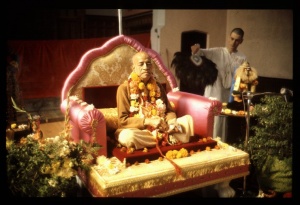CC Madhya 25.91

A.C. Bhaktivedanta Swami Prabhupada
TEXT 91
- prabhu kahe,—"āmi 'jīva', ati tuccha-jñāna!
- vyāsa-sūtrera gambhīra artha, vyāsa-bhagavān
SYNONYMS
prabhu kahe — Lord Śrī Caitanya Mahāprabhu replied; āmi jīva — I am an insignificant living being; ati tuccha-jñāna — My knowledge is very meager; vyāsa-sūtrera — of the Vedānta-sūtra, written by Vyāsadeva; gambhīra artha — very grave meaning; vyāsa — Vyāsadeva; bhagavān — the Supreme Personality of Godhead.
TRANSLATION
Śrī Caitanya Mahāprabhu replied, "I am an ordinary living being, and therefore My knowledge is very insignificant. However, the meaning of the Brahma-sūtra is very grave because its author, Vyāsadeva, is the Supreme Personality of Godhead Himself.
PURPORT
An ordinary living being cannot actually understand the meaning of the Vedānta-sūtra. One can understand the meaning if he hears it from the authority, Vyāsadeva himself. For this purpose, Vyāsadeva gave a commentary on the Brahma-sūtra in the form of Śrīmad-Bhāgavatam. He had been instructed to do this by his spiritual master, Nārada. Of course, Śaṅkarācārya distorted the meaning of the Brahma-sūtra because he had a motive to serve. He wanted to establish Vedic knowledge in place of the atheistic knowledge spread by Lord Buddha. All these necessities are there according to time and circumstances. Neither Lord Buddha nor Śaṅkarācārya is to be blamed. The time required such an explanation for the understanding of various types of atheists. The conclusion is that one cannot understand the meaning of the Vedānta-sūtra without going through Śrīmad-Bhāgavatam and rendering devotional service. Caitanya Mahāprabhu therefore further explains the matter in the following verses.